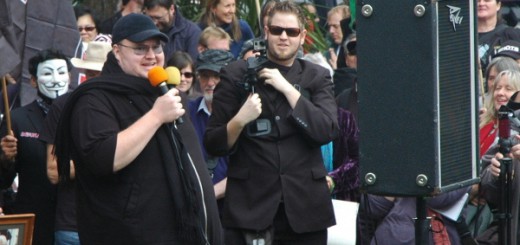In the last post, I concluded by looking at the Internet Party’s chances of taking the mantle of a populist party. But the downside of being populist is ideological incoherence. The unveiling of the deal with Mana was met by the wave of scepticism from the Establishment – perhaps symbolised best by TV3 political editor Patrick Gower, wholabelled the arrangement as ‘one of the dirtiest deals in New Zealand political history’.
Internet Party supporters might argue that this criticism is simply the expected ridicule of the elite, whose interest lies in protecting the status quo. But it would be wrong to totally ignore the idiosyncrasies of a party founded and funded by a wealthy foreigner, peddling a grab-bag of technology-driven and ostensibly leftwing policies, all the while being wedded to a Maori nationalist movement for the sake of expedience.
Sooner or later the Internet Party will have to answer the questions ‘what do we stand for?’, ‘what are our bottom lines?’ and ‘what can we compromise on?’
Ideology is not just an academic matter. The Alliance, Act, United Future and the Maori Party have all, to greater or lesser extents, been torn apart by ideological disputes over their policy direction. For the Alliance, it was the war in Afghanistan (amongst other issues). For Act, it has been the question over whether to emphasise social conservatism or economic liberalism. For the Maori Party it has been whether to be a nationalist and Establishment, or leftwing and radical party. The dispute led to the breakaway of Hone Harawira and the founding of Mana.
Does pragmatic populism and the ‘absence’ of a purist ideology provide a way out of such debates? Not necessarily. Populism is by its nature fickle – a party that is interesting mainly because it is new and different logically cannot be fuelled by this excitement indefinitely. The one arguably truly populist party in New Zealand politics – New Zealand First – imploded in the 1996-99 parliament, at a time when it was seeing its greatest electoral, populist-driven success.
2. Candidates
The Internet Party may also have laid the ground for division in its candidate selection process. The talent show-style roadshow and hunt for candidates began well before the nature of the deal with the Mana Party was revealed, and the unveiling of Laila Harre as the party’s leader. Up until this point, prospective candidates may have thought the party would be mainly a technologically-focused party, and the shortlist released last weekend reflects this.
It may have been wiser to wait to begin the candidate selection process until Harre had taken over the leadership. This would have allowed candidates to see more easily what would be expected of them, and may have seen a more ideologically-aligned group come to the fore.
As it stands, a good number of the profiles for the 22 shortlisted candidates contain what one might expect from a technology-focused party. For illustration, here are two prospective candidate profiles:
David Currin — 37
Dissatisfied with mediocrity
Born in Wellington, David moved to Europe in his teens where he studied Music, Physics, Modern History and then Architecture at the University of Liverpool.
Together with a friend he pioneered a successful UK design & retail business and then moved to Prague where he studied Czech, worked as an interpreter for the EU, acted in the odd movie, and learned how to build software. He’s currently living in the Far North with his young family and in charge of software engineering at a California based internet startup.
—
Callum Valentine — 26
Digital — Political — Citrus
Callum is currently the Social Media Engagement Manager for the Internet Party. He got involved with IP because he believes it represents exciting change in New Zealand politics.
He has had a life long love of technology, and has watched the Internet grow into one of humanity’s greatest assets. For him, the file-sharing bill represents why we need switched on voices in Parliament to speak up on digital issues.
We need to change, to digitise and to engage.
Previously, Callum has worked in Education — as a digital media tutor — teaching social media skills to journalists.
A counter-argument to this could be to point out that other candidates show no obvious technology background and bring with them complementary skills. But this also shows the lack of commonality between the candidates. Remember, should the Internet Party be moderately successful, at least some of these candidates will be working together around a caucus table, and will be negotiating to get policy gains from a much bigger and muscular political partner.
For an idea of what prospective Internet Party candidates see as their own distinctive traits, it is worth looking at their micro-descriptions of themselves. Would-be candidates were obviously asked to sum themselves up in two to three words. These words appear above each profile in bigger type. Here are all the description words used, put together:
Practical
Loyal
Organiser
Passionate
Empathetic
People Motivated
Empathetic
Friendly
Enterprising
Receptive
Environmentalist
Communicator
Optimist
Adventurer
Family
Resourceful
Sensitive
Strategic
Analytical
Friendly
Digital
Political
Citrus
Clever
Hardworking
Family
Dissatisfied with mediocrity
Visionary
Compassionate
Articulate
Social justice
Equality
Focussed
Articulate
Musician
Trustworthy
Committed
Realistic
Passionate
Friendly
Loyal
Three is not…
Dedicated
Capable
Equality
Big-picture
Negotiator
Centered
Thinker
Extreme
Humanitarian
Change Agent
Digital-native
Musician
Explorer
Tall
Samoan
Musician
The only words that are repeated are: articulate empathetic, equality, friendly, loyal, and musician. Overwhelmingly, the descriptors are personal, rather than political labels. These people – or some of them at least – will have to work together to pursue common goals.
While a new party will naturally involve drawing in people who are new to politics (in itself no bad thing), it is notable that the candidate shortlist is comprised entirely of political neophytes. The danger of political novices might be illustrated best by examining United Future in 2002, which drew in a large number of new MPs due to the party’s unexpectedly high election result. One consequence of this was a candidate being elected who was not even eligible to become an MP, as she was not a citizen. Another new MP was Paul Adams, a car dealer whose fundamentalist religious views led to him splitting from the party later in the term.
Ultimately, the Internet Party hierarchy will decide who its candidates will be. Just as Harre was selected as leader, we can expect some old hands will be brought in to steady the ship. Former Alliance MP Willie Jackson has been one name that has been mentioned as a Mana candidate. But an effective two-tier candidate hierarchy may create tensions of its own.
3. Luck
The Internet Party is a gamble. It is a gamble to think that voters even want a new party. It is a gamble that they will choose an untested vehicle over parties already established in Parliament. And it is a gamble that they will get up and vote for it on September 20.
Since MMP was introduced in New Zealand in 1996, winning representation has become harder for small parties. While parties other than Labour and National received 39% of the vote in 1996, by 2008 the figure was just 21%, before a small recovery to 28% in 2011. Voters seem to be more willing to kick the tyres of small parties when the election result seems a foregone conclusion: the high point for small parties came in 2002, when they received a collective 41% of the vote – see: Elections in New Zealand.
Moreover, the Internet Party will be competing for attention and votes in a crowded political marketplace on both the left and the political spectrum as a whole. No fewer than eight political parties (Internet Mana, Labour, Greens, New Zealand First, National, Act, United Future, Conservatives) seem likely to come away with at least one seat, which would be a record under MMP. The Internet Party will be fighting against all number of incumbent parties which have everything to lose and the resources of the state and their own parliamentary track-record behind them.
The Internet Party also appears to be hunting for previous non-voters, who by definition are harder to get to the polls than any other group. Labour, with all its human and union-backed financial resources and a targeted minimum wage bribe in South Auckland, failed to get the vote out to any great degree in 2011. If the Internet Party can manage to pick up any of the fabled ‘missing million’, it will be succeeding where others have tried and failed.
In the end, the success or failure of the Internet Party may come down to momentum. United Future’s ‘worm-driven’ poll increase in 2002 and the ‘Orewa speech’ by Don Brash in 2004 for National are both examples of political ‘circuit-breakers’ that changed conventional wisdom. If the Internet Party can register at, say, 5% in an upcoming opinion poll, voters may sit up and take notice. From there, gaining their attention becomes easier and credibility increases. But if the Internet Party is still languishing at 1 or 2% in the polls come August, it will be an also-ran. In other words, success breeds success – but failure can also breed failure.
The Internet Party may be successful in some form on September 20. But it will not be easy.
Homepage photo credit: StockMonkeys.com / Foter / Creative Commons Attribution 2.0 Generic (CC BY 2.0)

